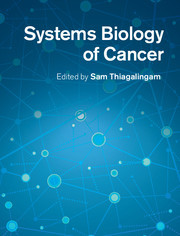Description
Systems Biology of Cancer
Coordinator: Thiagalingam Sam
An overview of the current systems biology-based knowledge and the experimental approaches for deciphering the biological basis of cancer.
Language: English
Subjects for Systems Biology of Cancer:
Publication date: 04-2015
548 p. · 19.5x25.3 cm · Hardback
548 p. · 19.5x25.3 cm · Hardback
Description
/li>Contents
/li>Biography
/li>
With over two hundred types of cancer diagnosed to date, researchers the world over have been forced to rapidly update their understanding of the biology of cancer. In fact, only the study of the basic cellular processes, and how these are altered in cancer cells, can ultimately provide a background for rational therapies. Bringing together the state-of-the-art contributions of international experts, Systems Biology of Cancer proposes an ultimate research goal for the whole scientific community: exploiting systems biology to generate in-depth knowledge based on blueprints that are unique to each type of cancer. Readers are provided with a realistic view of what is known and what is yet to be uncovered on the aberrations in the fundamental biological processes, deregulation of major signaling networks, alterations in major cancers and the strategies for using the scientific knowledge for effective diagnosis, prognosis and drug discovery to improve public health.
Contributors; Preface; Part I. Introduction to Modular Organization of the Networks of Gene Functions and Cancer: 1. Systems biology of cancer progression Sam Thiagalingam; 2. Lessons from cancer genome sequencing Antoine Ho and Jeremy S. Edwards; 3. Application of bioinformatics to analyze the expression of tissue-specific and housekeeping genes in cancer Xijin Ge; Part II. Alterations in the Regulatory Networks of Fundamental Cellular and Molecular Events in Cancer: 4. Events at DNA replication origins and genome stability Kathleen R. Nevis, Kimberly L. Raiford, Cyrus Vaziri and Jeanette Gowen Cook; 5. Systems biology approaches bring new insights in the understanding of global gene regulatory mechanisms and their deregulation in cancer Arnaud Krebs and László Tora; 6. Regulation and dysregulation of protein synthesis in cancer cells Michael J. Clemens, Androulla Elia and Simon J. Morley; Part III. Networks of Events Responsible for the Manifestation of Aberrant Genetic and Epigenetic Codes in Cancer: 7. Genomic instability and carcinogenesis Mark E. Burkard and Prasad V. Jallepalli; 8. Epigenomic code José Ignacio Martín-Subero and Manel Esteller; 9. MicroRNA epigenetic systems and cancer Holly Lewis and Aurora Esquela-Kerscher; 10. Dietary and environmental influences on the genomic and epigenomic codes in cancer Hamid Abdolmaleky and Jin-Rong Zhou; Part IV. Functional Networks of Events that Modulate Phenotypic Manifestation of Cancer: 11. Regulatory signaling networks in cell transformation and cancer Yashaswi Shrestha and William C. Hahn; 12. RAS signaling networks Douglas Faller; 13. The PI3K pathway in cancer Amancio Carnero; 14. TGFβ and BMP signaling in cancer Panagiotis Papageorgis, Arthur W. Lambert, Sait Ozturk and Sam Thiagalingam; 15. The Wnt signaling network in cancer Johanna Apfel, Jignesh R. Parikh, Patricia Reischmann, Rob M. Ewing, Oliver Müller, Yu Xia and Isabel Dominguez; 16. Apoptotic pathways and cancer Jian Yu and Lin Zhang; 17. Molecular links between inflammation and cancer Paola Allavena, Giovanni Germano and Alberto Mantovani; 18. Cancer metastasis Sait Ozturk, Arthur W. Lambert, Chen Khuan Wong, Panagiotis Papageorgis and Sam Thiagalingam; 19. Cancer metabolism Dimitrios Anastasiou, Jason W. Locasale and Matthew G. Vander Heiden; 20. Tumor microenvironment: blood vascular system in cancer metastasis Shantibhusan Senapati, Rakesh K. Singh and Surinder K. Batra; Part V. Current State of the Evolving MMMN Cancer Progression Models of Cancer: 21. Genetic alterations in glioblastoma multiforme Giselle Y. López, Marc Samsky, Rosanne Jones, Cory Adamson and Hai Yan; 22. Breast cancer Arthur W. Lambert, Sait Ozturk, Chen Khuan Wong, Panagiotis Papageorgis and Sam Thiagalingam; 23. The role of growth factor induced changes in cell fate in prostate cancer progression Min Yu, Gromoslaw A. Smolen, Daniel A. Haber and Shyamala Maheswaran; 24. Colon cancer Anthony Scott and Zhenghe Wang; 25. Biology of human stomach cancer Bryan G. Sauer and Steven M. Powell; 26. Pancreatic cancer Sergii Ivakhno, Kristopher Frese, Simon Tavare, Christine Iacobuzio-Donahue and David Tuveson; 27. Deregulated signaling networks in lung cancer Anurag Singh; 28. Modular signaling in hematopoietic malignancies Adam Lerner; Part VI. Applications of Comprehensive Cancer Progression Models in the Fight against Cancer: 29. Role of network biology and network medicine in early detection of cancer Asad Umar and Simon Rosenfeld; 30. Systems biology in cancer biomarkers for early detection, diagnosis and prognosis Sudhir Srivastava and Karl Krueger; 31. Prognosis of cancer Sharyn Katz and Wafik S. El-Deiry; 32. Cancer pharmacogenomics: challenges, promises, and its application to cancer drug discovery Lihua Yu and Kevin Webster; Index.
Dr Sam Thiagalingam is an Associate Professor of Genetics and Genomics, Medicine and Pathology at the Boston University School of Medicine. He played a major role in establishing an association between genomic instability and loss of heterozygosity (LOH) in human cancers. He was the first to show that SMAD4 inactivation is a critical event during the late stages of colon cancer progression and sustained TGFβ signaling events are required to maintain epigenetic memory during breast cancer progression. Dr Thiagalingam also proposed a simple minded multi-modular molecular network (MMMN) cancer progression model as a road map to visualize the various gene alterations in modules of networks of pathways. His long-term goal is to identify novel cancer biomarkers and therapeutic targets by contributing to the 'big picture' of interconnected networks of events that mediate cancer progression to metastasis using breast and colon cancers as the model systems.
© 2024 LAVOISIER S.A.S.




